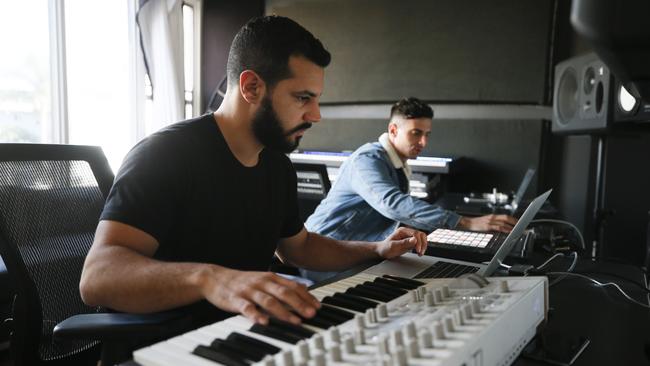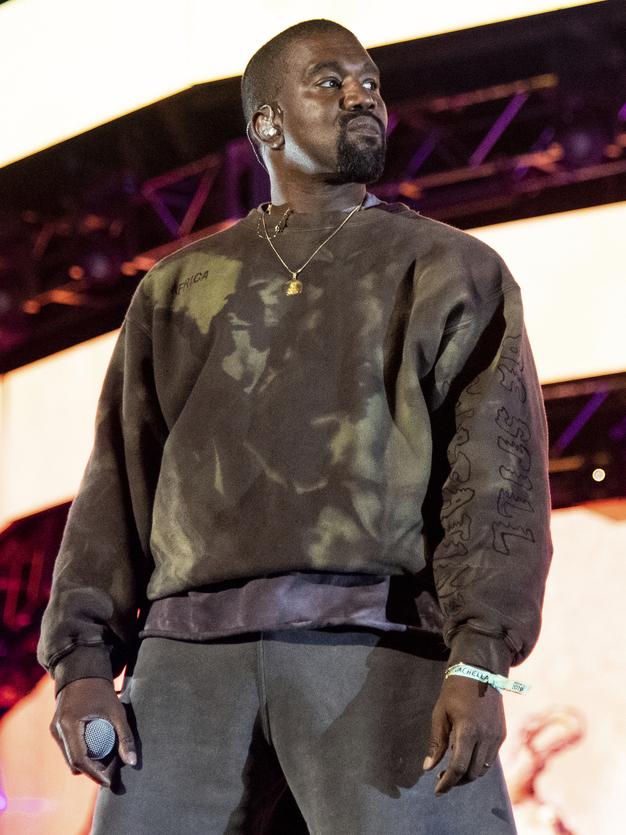Producers Michael Mule and Isaac De Boni take leap with Kanye West
Perth beat-makers Michael Mule and Isaac De Boni are setting the tempo for America’s top hip-hop artists.

For the past year Michael Mule and Isaac De Boni had been sitting on a big secret, the kind of ground-shattering information that could change their fortunes by launching them into the upper echelons of the US music industry.
Late last month, the world at last learned what the two Australian producers had successfully kept under wraps for 12 months: their work was used in a song released by one of the most popular and successful recording artists in the world, Kanye West.
The track named Everything We Need appears in the middle of West’s ninth studio album, which blurs the line between hip-hop and gospel music.
MORE FROM ANDREW McMILLEN Beatboxer Tom Thum | Bad Seeds violinist Warren Ellis
It’s a typically divisive work by a divisive artist whose out-size celebrity in recent years has somewhat overshadowed his roots as a humble hip-hop producer with a rare ear for vintage samples.
Near the end of his album Jesus is King — a 27-minute, 11-track release — West raps, “Told people God was my mission / What have you been hearing from the Christians? / They’ll be the first one to judge me / Make it feel like nobody love me.”
For Mule and De Boni — 32-year-old friends from Perth who work under the name FNZ, short for Finatik N Zac — that track with West has shot straight to the top of their career achievements.
The album is an undeniable hit: in the US, Jesus is King topped the Billboard 200, meaning West now matches fellow rapper Eminem with nine consecutive No 1 debuts. In Australia, it became West’s third No 1 on the ARIA chart, following 2013’s Yeezus and 2018’s Ye.
On the song credits for Everything We Need, Mule and De Boni are among 11 writers, while FNZ is listed as one of the six producers. These bulging lists are typical for high-end hip-hop projects, and they reflect the circuitous way in which this collaboration came about.
The short version is this: after visiting a friend’s studio and hearing some of his ideas, Mule and De Boni were struck by one that sounded ideal for West.
They took that idea — with permission, of course — and continued working on it, until they were contacted by another friend who happened to be travelling with West. The pair sent over a few folders of tracks and, before they knew it, West and his own team of collaborators had picked it up and run with it.
“We found out not too long after what they’d done with it, and we flipped out,” Mule says from FNZ’s studio in Los Angeles. “It was a pretty crazy experience because we knew at that point it was a turning point for our careers. This was something we’d been striving for our whole lives.”

Because of the collaborative nature of this style of hip-hop songwriting — where headphones-wearing beat-makers regularly trade audio files across time zones to play for artists in the hope of inspiring them to enter the vocal booth, rhymes in hand — Mule and De Boni are unable to point to the specifics of their work on the track.
“Even as a producer listening to music, I prefer not to know,” Mule says. “If it’s magic on the day you hear it and you’re loving it, you just take in the final song for what it is rather than ripping it apart. You either fall in love with it or you don’t.”
Although it runs for a touch under two minutes, FNZ’s contribution to Everything We Need may come to fulfil the song’s title as far as Mule and De Boni’s careers are concerned. “I think it’s going to do a lot,” De Boni says of the West credit. “He’s just one of those artists where only a select few people get cuts with him.
“We’re just happy we got on this right now; we’re happy to be a part of history. No matter which way you look at it, his stuff is polarising; it always has been, really. It’s obviously going to help our career — but it’s more than that.”
“There’s no telling what will happen tomorrow,” says Mule, nodding at his partner. “There are stepping stones all along the way — but this is a big leap.”
It took a big leap of another sort for FNZ to make the move from Perth in the first place. At the age of 12 Mule, aka Finatik, became fascinated by turntables, and at 15 he placed second in a national DJ competition that earned him nightclub gigs while supervised by his parents. After he tired of DJing, he met De Boni, aka Zac, around the age of 18 and they began a shared hobby of using computer software to make beats outside of their day jobs.
“We were never making instrumental music; we were always making beats with the intention of getting artists on them, but it was frustrating being from a place like Perth, where there is literally no industry, and no (record) labels,” De Boni says, referring to the situation in which they found themselves about a decade ago.
“So we were just holed up in the studio, working on stuff, without that much of an outlet to get our beats out there.”
The pair didn’t connect with the sound of Australian hip-hop a decade ago, or seriously attempt to work with domestic artists in that genre. “We had our sights set more on the US because that’s the music that we liked listening to,” says Mule. After making a tenuous online connection with a successful US producer named Jim Jonsin in 2008, followed by months of radio silence — possibly because they lived in Western Australia, out of sight, out of mind — the pair took a risk by flying to Miami, Florida, in February 2009.
That gamble paid off: Jonsin admired their hustle and signed them to a production deal that triggered plenty of flights between Perth and Florida, until Mule and De Boni began calling Miami home from 2011.
More recently they have developed an ongoing relationship with platinum-selling hip-hop artist A$AP Rocky, aka Rakim Mayers, who is perhaps best known outside of music circles for being held in a Swedish jail for a month on an assault charge earlier this year, prompting a tweet from Donald Trump seeking a prompt resolution.
In 2016 Mule and De Boni shifted to Los Angeles, a move spurred by the lure of making further connections, as well as strengthening their relationship with a rapper on the rise named Denzel Curry. FNZ has worked closely with Curry on his last two albums, this year’s ZUU and last year’s TA13OO (pronounced “taboo”), both of which they executive produced.
Last month Curry toured Australia with the Listen Out electronic music festival. As it happened, De Boni was back home visiting his family, so he heard Curry acknowledge FNZ at the start of his Perth set by telling the thousands-strong crowd that much of his music had been produced by a couple of local guys.
Beyond that nod from his livewire collaborator, though, De Boni couldn’t help but smile at the awe-inspiring sound of a booming festival speaker system playing the beats he and Mule had spent so many hours crafting in their studio on the other side of the world. To him, it felt like they’d come a long way.

